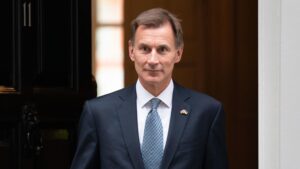<?xml encoding=”utf-8″ ?????????>
The UK Chancellor has disagreed with claims that the UK economy has a ‘broken leg’ but instead says is has a ‘sprained ankle’ as he blames Brexit for sparking half a decade of instability leading to ‘incredibly challenging times’, voiced at an event hosted by the Resolution Foundation thinktank and London School of Economics’ Centre for Economic Performance (CEP).
At the event, Jeremy Hunt has defended tax cuts while describing the UK as one of the world’s best and most brilliant countries making reference to strong industries such as the UK’s higher education system, its technology industry and its record on climate change.
The Resolution Foundation and CEP’s Economy 2030 Inquiry final report said British workers were missing out on £10,700 a year, however, Hunt defended last month’s autumn statement by arguing that £20bn of tax cuts could help boost economic growth by filling vacancies, promoting investment and improving productivity.
The Institute of Fiscal Studies had other ideas around the statement and said that spending plans for after the general election will set the country up for a painful period of austerity while Hunt believes the UK has one of the most untapped potential globally and has goals to unlock its potential offering “the most competitive business investment reliefs in the world”.
Khalid Talukder, Co-founder of DKK Partners commented: “Businesses have faced huge challenges over the past few years consisting of a toxic mix of rampant inflation, souring interest rates and broken supply chains. Catalysed by Brexit, the pandemic and various other socio-economic conditions, the UK is now attempting to recover from a period of turbulence and businesses must remain confident that brighter times are ahead.”
“As the country begins to stabilise, small and medium businesses will turbo charge the growth agenda and they must remain both robust and resilient as they acclimatise to the new normal. The government must support the businesses and industries that will help lead the UK to much desired Tech superpower status, such as the Fintech and payments industry that hold huge potential globally. They must also focus on capitalising upon our Brexit freedoms which will open up new business opportunities promoting both growth and international relations, helping to cement our position worldwide.”
